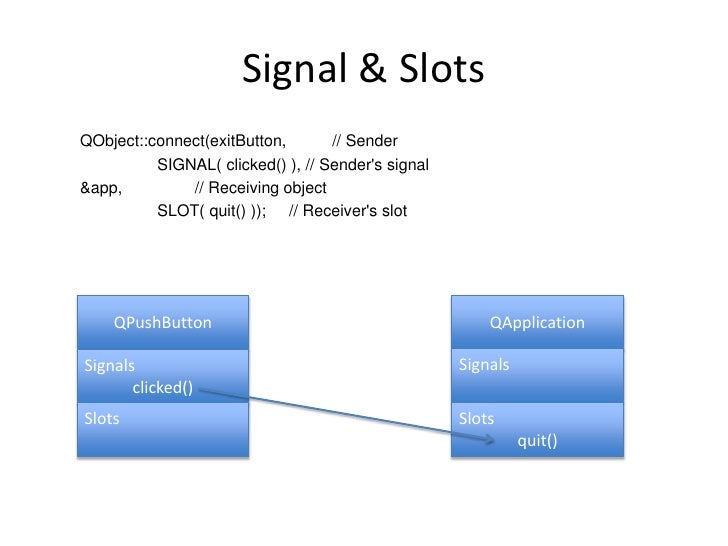Qt Slot Derived Class
@Asperamanca said in Disconnect all incoming and outgoing connections from QObject-derived class manually. He QGraphicsItem destructor of the parent item (which runs before the QObject destructor) destroys the child, which fires a signal to tell the world text editing was canceled, which calls the slot in my already half-destroyed parent item. Without QWidget really having this method. This allows to easily make normal methods of Qt classes callable by forwarding them with such decorator slots or to make CPP classes (which are not derived from QObject) callable from Python. Sometimes it is even desirable to have the signal private. This is the case for example in QAbstractItemModel, where otherwise, developers tend to emit signal from the derived class which is not what the API wants. There used to be a pre-processor trick that made signals private but it broke the new connection syntax.
The following are the built-in features of the PythonQt library:
- Access all slots, properties, children and registered enums of any QObject derived class from Python
- Connecting Qt Signals to Python functions (both from within Python and from C++)
- Easy wrapping of Python objects from C++ with smart, reference-counting PythonQtObjectPtr.
- Convenient conversions to/from QVariant for PythonQtObjectPtr.
- Wrapping of C++ objects (which are not derived from QObject) via PythonQtCppWrapperFactory
- Extending C++ and QObject derived classes with additional slots, static methods and constructors (see Decorators)
- StdOut/Err redirection to Qt signals instead of cout
- Interface for creating your own
importreplacement, so that Python scripts can be e.g. signed/verified before they are executed (PythonQtImportFileInterface) - Mapping of plain-old-datatypes and ALL QVariant types to and from Python
- Support for wrapping of user QVariant types which are registerd via QMetaType
- Support for Qt namespace (with all enumerators)
- All PythonQt wrapped objects support the dir() statement, so that you can see easily which attributes a QObject, CPP object or QVariant has
- No preprocessing/wrapping tool needs to be started, PythonQt can script any QObject without prior knowledge about it (except for the MetaObject information from the moc)
- Multiple inheritance for C++ objects (e.g. a QWidget is derived from QObject and QPaintDevice, PythonQt will automatically cast a QWidget to a QPaintDevice when needed)
- Polymorphic downcasting (if e.g. PythonQt sees a QEvent, it can downcast it depending on the type(), so the Python e.g. sees a QPaintEvent instead of a plain QEvent)
- Deriving C++ objects from Python and overwriting virtual method with a Python implementation (requires usage of wrapper generator or manual work!)
- Extensible handler for Python/C++ conversion of complex types, e.g. mapping of QVector<SomeObject> to/from a Python array
- Setting of dynamic QObject properties via setProperty(), dynamic properties can be accessed for reading and writing like normal Python attributes (but creating a new property needs to be done with setProperty(), to distinguish from normal Python attributes)
- Support for QtCore.Signal, QtCore.Slot and QtCore.Property, including the creation of a dynamic QMetaObject.
PythonQt offers the additional PythonQt_QtAll library which wraps the complete Qt API, including all C++ classes and all non-slots on QObject derived classes. This offers the following features:
- Complete Qt API wrapped and accessible
- The following modules are available as submodules of the PythonQt module:
- QtCore
- QtGui
- QtNetwork
- QtOpenGL
- QtSql
- QtSvg
- QtWebKit
- QtXml
- QtXmlPatterns
- QtMultimedia
- QtQml
- QtQuick
- Any Qt class that has virtual methods can be easily derived from Python and the virtual methods can be reimplemented in Python
- Polymorphic downcasting on QEvent, QGraphicsItem, QStyleOption, ...
- Multiple inheritance support (e.g., QGraphicsTextItem is a QObject and a QGraphicsItem, PythonQt will handle this well)
- QtQuick support is experimental and currently it is not possible to register new qml components from Python
PythonQt supports:

Qt Slot Derived Class Example
%2C+dest%2C+SLOT(+signature+)+)%3B.jpg)

- Python 2 (>= Python 2.6)
- Python 3 (>= Python 3.3)
- Qt 4.x (Qt 4.7 and Qt 4.8 recommended)
- Qt 5.x (Tested with Qt 5.0, 5.3, 5.4 and 5.6)
The last working Qt4 version is available at svn branches/Qt4LastWorkingVersion or you can download the PythonQt 3.0 release. The current svn trunk no longer supports Qt4, since we started to make use of some Qt5-only features.
Qt Slot Derived Classes
- PythonQt is not as pythonic as PySide in many details (e.g. buffer protocol, pickling, translation support, ...) and it is mainly thought for embedding and intercommunication between Qt/Cpp and Python
- PythonQt offers properties as Python attributes, while PySide offers them as setter/getter methods (e.g. QWidget.width is a property in PythonQt and a method in PySide)
- PythonQt currently does not support instanceof checks for Qt classes, except for the exact match and derived Python classes
- QObject.emit to emit Qt signals from Python is not yet implemented but PythonQt allows to just emit a signal by calling it like a normal slot
- Ownership handling of objects is not as complete as in PySide and PySide, especially in situations where the ownership is not clearly passed to C++ on the C++ API.
- QStrings are always converted to unicode Python objects, QByteArray always stays a QByteArray and can be converted using QByteArray.data()
- Qt methods that take an extra 'bool* ok' parameter can be called passing PythonQt.BoolResult as parameter. In PySide, a tuple is returned instead.